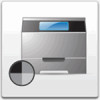Lexmark Monochrome Laser Complete Printer Reference (1.7 MB) - Page 110
Custom paper types, Multi printing
 |
View all Lexmark Monochrome Laser manuals
Add to My Manuals
Save this manual to your list of manuals |
Page 110 highlights
Custom paper types You can use MarkVision or PJL commands to assign names to custom paper types to identify unique media. First, identify the media type (paper, transparency, card stock, and so on), and then assign a recognizable name. This lets the printer optimize the print quality on the media actually being used. The name you assign is truncated to 16 characters. Multipage printing When printing proofs or very long documents, you can choose to print multiple pages (sometimes called n-up printing) on one sheet. The Multipage Print menu item lets you specify 2, 3, 4, 6, 9, 12, or 16 pages to be printed on a single sheet. If you select the 4 Up menu item, for example, 4 pages are printed on one sheet. N-up printing conserves paper and printer supplies, and may reduce the print time necessary for a particular document. The printer uses the Multipage View, Multipage Order, and Multipage Border settings to determine the order and orientation (portrait or landscape) of the pages, and whether a border is printed around each page image. The following figure shows a 4 Up print job in portrait page orientation, with Horizontal selected as the Multipage Order. Notice how the page images are paginated from left to right. Page 1 Page 2 Page 3 Page 4 Paper handling 110















